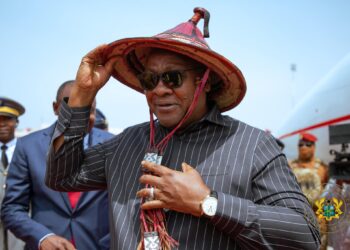Vice President of Strategy at the IMANI Centre for Policy and Education, Selorm Branttie, has revealed that the ministry of education may have rushed in changing the curriculum of schools in the country.
According to him, curriculum research and development stage takes many years to develop. As such, when one wants to run or perhaps change a system like this, it is prudent to have planned a couple of years in advance on what to do.
“The future of this country is receiving very little or no direction as to the most important tool they will require to be able to sustain themselves and actually build the country… So, it looks like either the ministry rushed the whole curriculum planning thing, or they were misinformed about the logistics required on the ground, or they were just probably extremely clueless about it.”
Selorm Branttie
Commenting on the schools in Krachi Nchumuru district which have received textbooks for only three subjects, Mr Branttie stated that it’s surprising how one of the poorer regions in the country which still has high dependency ration or a very high population of young people have absolutely no clue as to how they are going to have their education for the next year or two.
He noted that by the time the textbooks are in, the students will need extra time to catch up with other classmates from other privileged parts of the country and these are things that actually deepen the poverty divide; where the poor get poorer, while others get the chance for the fewer opportunities that exists.
“So, this is a very big indictment and very atrocious… If you think about the large term implications, the ministry of education has really failed, the Ghana Education Service in itself has also failed, as well as the district assemblies because even if the main people could not do anything, they should have been able to put some resources together to safeguard the education of the future of the district.”
Selorm Branttie
Elaborating on the reasons for the prolonged development of education in the country, Mr Branttie lamented the pace at which education within the country is developing. He opined that the cause of the problems within the sector is not the fact that the leaders do not have the requisite education and information, but those who are running the sector are either not up to the task or are not planning well to secure funds for education.
“This is a country where a lot of primary and secondary schools started from the villages. Infact, for most of the people in leadership today, those who are above fifty, sixty and seventy, most of them actually started their education from the villages around the time of independence when our infrastructure was far less than it is today. Yet, people still had access to very good foundational education. So, what has changed?”
Selorm Branttie
Addressing challenges with MoE curriculum
The IMANI Vice President emphasized that after sixty years of independence, Ghana cannot still be having challenges in education, especially where in pre-colonial days it was better than it is now. Justifying his stance, he explained that considering the fact that nations are in a digital age and developing, there is the need to do more.
“This is actually an indictment of everyone in the leadership and in education right now and it should not be treated as a political issue but as a huge social crisis. If we do not do that, we have failed…”
Selorm Branttie
To address the infrastructure gap, Mr Branttie suggested that government must move from paying lip-service to addressing the situation. He further expressed the need for a petition to be sent to parliament to investigate the root cause of these issues.
“If it means reversing to the old curriculum, whiles we wait for the infrastructure of the new curriculum to take place, we should. The children should be able to learn something, and the teachers should not use their meagre salaries to be sponsoring their education when they themselves do not get enough to keep body and soul together…”
Selorm Branttie




















